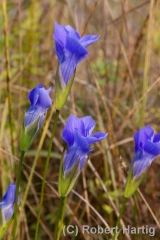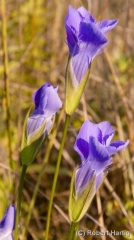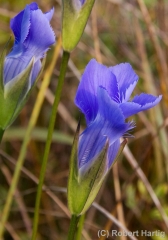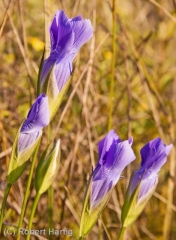Welcome to September Land. It’s not a location you can pinpoint on any map, but it exists just the same. It’s a place of being; a juncture of time and mood; a coming-of-age of the summer when the sun’s lengthening rays gild the late-day hills, clown-colored maples stipple the forests, and yellow hues infiltrate the long, green rows of corn. September Land is where the year goes to receive its golden crown of wisdom; and where, as the hazy, blue sky of early autumn stretches, glowing, over meadows filled with asters and birdsong, you and I arrive to contemplate with nostalgia the months that lie behind us, and to quietly adjust our souls for the ones to come.
Now is the season of the gentians. Here in mid-September, they dot the wetlands with pointilistic splashes of purest blue, as if God had strewn pieces of sky like confetti over the fens.
I love the deep purple asters, the burnished goldenrods, and the bright, butter-yellow wild snapdragons. I’ve been a sucker for wildflowers ever since I can remember. But of all the autumn flowers, I like the gentians best. A number of species inhabit my state of Michigan, but the fringed gentian is the one I see most often, and the one I fell in love with as a boy roaming through the wetlands of southern Kent County.
The fringed gentian opens only in the sun. On bright days, it quietly unfurls its cerulean gown, and, like a shy young woman unaware of her own breathtaking beauty, captures the eye and heart of every beholder.
Among the many who, over the years, have been smitten by the gentian was the 19th-century poet William Cullen Bryant. Like me, he sought for words that could pay adequate tribute to the gentian’s loveliness, and set them down in his jewel-like poem, “To the Fringed Gentian”:
Thou blossom bright with autumn dew,
And coloured with the heaven’s own blue,
That openest when the quiet light
Succeeds the keen and frosty night.
Thou comest not when violets lean
O’er wandering brooks and springs unseen,
Or columbines, in purple dressed,
Nod o’er the ground-bird’s hidden nest.
Thou waitest late and com’st alone,
When woods are bare and birds are flown,
And frosts and shortening days portend
The aged year is near his end.
Then doth thy sweet and quiet eye
Look through its fringes to the sky,
Blue—blue—as if that sky let fall
A flower from its cerulean wall.
I would that thus, when I shall see
The hour of death draw near to me,
Hope, blossoming within my heart,
May look to heaven as I depart.
Here in Caledonia, Michigan, the woods of September Land are not bare nor are the birds yet flown. As I write, the hummingbirds still flit about the feeder out on my balcony. But frost has already visited counties to the north, and in these shortening days I, like Bryant, sense that “the aged year is near his end.”
Yesterday, Lisa and I enjoyed a spontaneous picnic out at Gun Lake State Park. With Labor Day behind us, the crowds of summer were gone and we had the park to ourselves. We sat at a picnic table, eating and talking and watching a great blue heron patrol the shoreline a stone’s throw away. Then, after strolling a bit through the southern tip of the park’s peninsula, we hopped into the car and headed back toward Caledonia. However, I had one stop-off to make in Middleville: a small but diverse prairie fen on the south end of the town.
While Lis drowsed off in the car, I hiked down the trail into the fen with my camera to photograph fringed gentians. With the sun waning and occasionally disappearing behind tufts of cumulus, many of the gentians had closed. But a few flowers remained open. I set up my tripod next to a likely looking cluster and began snapping photos. This page contains a few of them. Click on the images to enlarge them.
“Consider the lilies of the field, how they grow,” said Jesus. “They don’t work themselves to a frazzle, nor do they weave clothes for the wearing. Yet I tell you that even Solomon in all his splendor was not arrayed like these humble wildflowers.” (Matthew 6:28–29, my rendering.)
I suspect that if gentians had been at his disposal, Jesus would have pointed to them as his object lesson of the grace God bestows on quiet, lowly hearts that look to him. In these times of great national and worldwide distress, may you and I, like the gentians, learn to turn our heads upward with trust and a willingness to let God determine for us what life is truly about–and in so doing, find a peace rooted in something, in Someone, far more steadfast than the changing seasons of this world.





